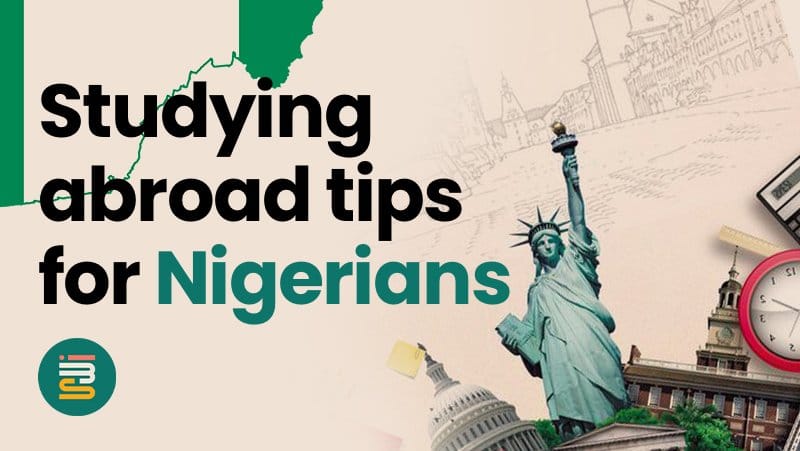Top Studying Abroad Tips for Nigerian Students
Are you looking to study overseas? Studying abroad requires careful thought, preparation, and planning. However daunting the process may feel, it’s important to remember it is very possible as many before you have successfully taken this path.
It is going to be a new culture, a new system, with different personalities from around the world so you have to be ready to manage the unique challenges it may present.
This article will highlight some of the most important studying abroad tips for Nigerian students going overseas and how to make the most of your experience.
Read More: Can I combine waec and neco to study abroad
Research Your Study Destinations and Programs
It is not enough to like a program or a study destination. You have to really research and understand the program as well as the environment. Consider this your number one studying abroad tip as a Nigerian student because this determines your entire experience.
When you research thoroughly, you would be able to pick a country and university that aligns with your academic goals, financial situation, as well as your preferences.
Read More: How to get a job in usa from ghana
What countries are the most popular study abroad destinations for Nigerian students?
Popular study abroad destinations for Nigerian students often have peculiar features that make them common choices among students studying overseas. Some of these factors include the educational system, cultural diversity, and the level of support the environment offers. Some of the popular study abroad destinations to consider include:
1. United States
When it comes to programs and universities, the US is home to lots of diverse programs and prestigious universities. This makes it a top choice for many Nigerian students. Institutions like Harvard, Stanford, and MIT, are common choices because of their state-of-the-art facilities and excellent research opportunities.
2. United Kingdom
The UK has a rich academic background and it’s home to institutions like Oxford, Cambridge, and Imperial College London. Their programs are fast and can generally be completed in a relatively shorter timeframe.
3. Canada
Canada has a generally welcoming culture and a high-education system. Many of its popular universities like McGill University and the University of Toronto are known for their many research opportunities and diverse campus population.
4. Australia
Australia has a high standard of living and many of its universities make the top world rankings yearly. Common choices among Nigerian students that study here include the University of Melbourne and Australian National University.
Read More: Study data science in the usa
What factors should I consider when choosing a program and university?
There are a lot of things to be considered when choosing a program and university overseas. First of all, you should research your academic background. Understand the quality of programs offered, global rankings, faculty qualifications, and research output. Also review the curriculum and course structure to ensure it matches your goals and interests.
After this you want to understand the cost and the lifestyle you can maintain while at it. Calculate the tuition and other expenses to see if you can meet up. Then you can look for scholarships or grants to lessen the burden.
Lastly, post-graduation employment opportunities, as some countries offer post-study work visas that can be a fine opportunity to build a thriving career.
Read More: Studying data analytics in the usa
Prepare Your Finances
If you have ever requested or searched for studying abroad tips for Nigerian students then one of the first things you were told were finances. Furthering your education abroad is a huge financial investment that you must plan well for in order to enjoy the experience.
Read More: Best universities to study data science in usa
How much does it cost to study abroad on average?
There is no fixed cost to study abroad and the investment you would need to make depends on several factors. However, some of the compulsory costs you would incur regardless of your choice includes tuition, living and travel expenses, and health insurance.
- Tuition
On average, the tuition fees for studying abroad as a Nigerian student ranges between $10,000 and $50,000 every year. The cost can be slightly higher or lower depending on the country and institution. Countries like the US and the UK tend to have higher tuition fees compared to countries like Germany.
- Living Expenses
The cost of living can also fluctuate due to inflation and other economic factors. You would need to calculate the amounts that would conveniently cater to your accommodation, food, transportation, and other personal expenses. The total cost for this on a yearly basis can be around $10,000 to $20,000.
- Travel Expenses
The airfare for your round trip can be around $1000 to $1500 or even more depending on your location and your travel destination.
- Health Insurance
Health insurance is mandatory in many countries and as a Nigerian student studying overseas, you would need to purchase this. It can cost as high as $2000 on a yearly basis.
Read More: Study abroad loan in nigeria
What financial aid and scholarship options are available for Nigerian students?
There are many financial aid and scholarship options available for Nigerian students looking to study abroad. Researching and applying for the necessary funding early on is like the most important educational tip for any Nigerian student studying abroad as you need funding to do well academically.
Many universities offer scholarships for international students like the Chevening scholarship in the UK and the Fullbright scholarship in the US. There are also Government scholarships like the Commonwealth Scholarships, the DAAD scholarships in Germany, and the Australia Awards.
The MasterCard Foundation Scholars Program and the Joint Japan/World Bank Graduate Scholarship Program are examples of private and non-governmental organization scholarships that are often offered on the basis of merit.
Where you are unable to secure funding via any of the above means, you can consider student loan options for international students or work-study programs that allow you to work part-time while studying.
Read More: Howard university acceptance rate
When should I start applying for funding?
You can never start too early when it comes to applying for funding as a Nigerian student looking to study abroad. This is because the competition is much as starting early can be an advantage.
Give yourself a 12-18 months plan. Start by researching the available programs and creating a list of options open to you. Then prepare your application materials and ensure each document fits the specific requirements of each funding opportunity.
Apply for Student Visas in Advance
Getting a visa as a Nigerian student can be tough. Some students have missed study opportunities due to delayed or denied visas. This is why it’s impossible to have a list of study abroad tips where this does not make the list. Let’s look at the different student visa types, the application process, and the features they permit.
What types of student visas are required for studying abroad?
There are different student visa types for Nigerian students looking to study abroad and the one you apply for depends on the country you are going to. In the United States, the F-1 visa is for academic purposes while the UK offers the tier 4 visa for students. For Australia, it is the subclass 500 visa and Canada, study permits. Each visa type has specific requirements and regulations so do well to research properly before applying.
How long is the visa application process for most countries?
The visa application process differs for every country and generally takes weeks to months. The processing time for the US F-1 visa is between 1-3 months while the UK tier 4 visa takes about three weeks. Applying as early as possible can help prevent unnecessary delays.
Can I work part-time in my host country on a student visa?
Most countries allow international students to work part-time while studying. A Nigerian student with a US F-1 visa or the UK tier 4 can work up to 20 hours per week. There are similar provisions for holders of the Canadian and Australian visa allowing students to work part time during their studies.
Read More: Is IELTS difficult
Arrange for Housing Before Departing Nigeria
Housing is a common source of frustration for many Nigerian students that move to study abroad ill-prepared. Planning ahead ensures you have a comfortable and safe place to stay upon arrival.
What housing options do most universities provide for international students?
Many universities provide a range of housing options for international students. These options include dormitories, student apartments, and shared housing. With on-campus accommodation, you get to enjoy extra convenience and support from your environment. You will also get to meet students from other cultures and build new connections.
When should I begin searching for off-campus housing?
Off-campus housing can be a great option too and it’s best to begin searching as soon as you receive your acceptance letter. This would give you enough time to familiarize with the local rental regulations and settle lease agreements.
How can I make sure my housing is safe and convenient?
To get a safe and convenient housing, you need to search thoroughly and visit the place in person before renting it. Consider neighborhoods that are close to school and known for safety. You can check ratings and reviews online or seek recommendations from other students.
Read More: Entrance exams to study in Canada
Get Familiar with the Education System
Our last studying abroad tip is getting familiar with the education system of your chosen country and institution. This involves understanding their calendars, language requirements, and other support services that you may need.
How do academic calendars and structures vary between countries?
Academic calendars and structures vary across countries. The United States for instance runs an academic year involving two semesters from August to May. The schedule in the UK is similar but they often have a quarter system instead. European universities run sessions from October to July.
What language requirements do I need to meet?
For English speaking countries, you would need to take a proficiency test like IELTS and TOEFL. The language proficiency tests for non-English speaking countries are often in the native language. This can be DELF for French, TestDaF for German, and so on.
How can I get help adjusting to a new educational system?
Most universities have support services for international students. There are often orientation programs, academic advising, and tutoring services. You can also get support from communities like student organizations and cultural clubs.
Read More: UK universities that accept wassce results
Conclusion
Deciding to go to school abroad can be fun, exciting, and rewarding. It can also be a difficult experience if you fail to plan well. These comprehensive studying abroad tips for Nigerian students can guide you through the process from application to settling in your new school. If you face challenges or require tailored assistance, feel free to reach out for a consultation here.
Read More: Exams required to study in UK for Nigerian students
FAQs
How much luggage can I bring on the plane?
On average, one or two checked bags and one carry-on bag.
What vaccinations will I need before traveling?
The vaccinations required varies for each country so do well to check the specific requirements.
Can I work part-time in my host country on a student visa?
Yes, many countries allow part-time work on a student visa.
What are some tips for Nigerian students studying abroad?
If you want to maximize your study abroad experience, prepare thoroughly by researching your destination, understanding local culture, and engaging with student support services. This will help make your study abroad experience smoother and more rewarding.



